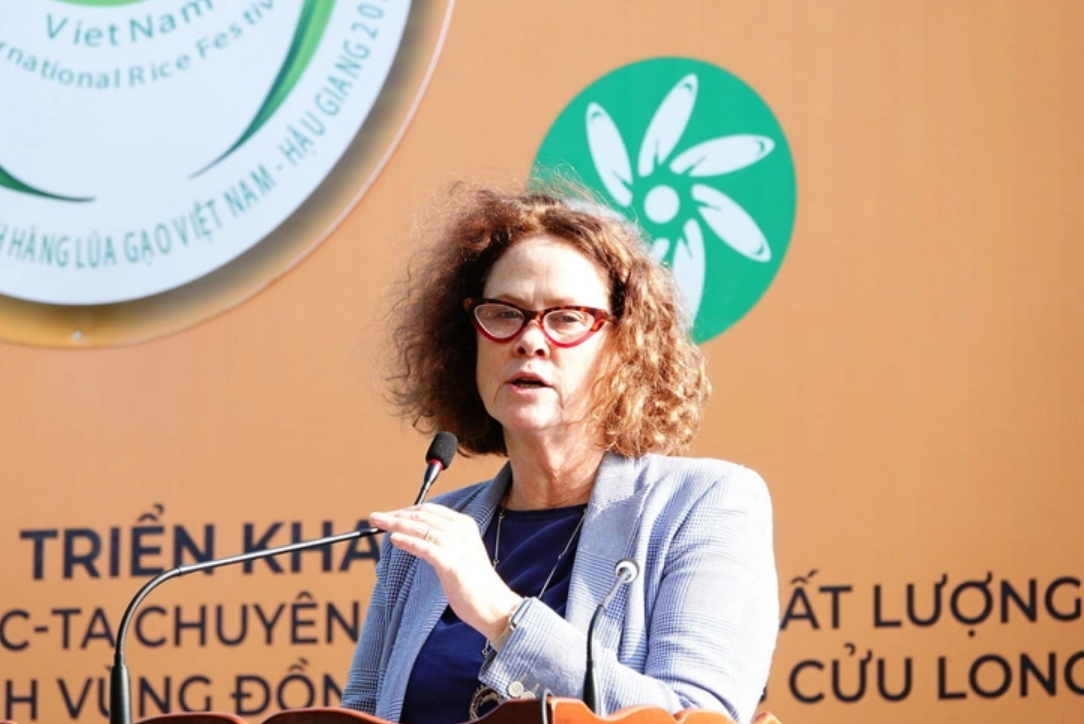Representatives of the World Bank (WB) and the International Rice Research Institute (IRRI) highly value and remain committed to its support for Vietnam's project to grow one million hectares of high-quality, low-emission rice in the Mekong Delta region.
WB country director for Vietnam Carolyn Turk highly lauded the Vietnamese government over this ambitious project at a ceremony to launch it on Tuesday, the Vietnam Government Portal reported.
Turk added that the project not only goes in line with green growth criteria but it is also aimed at three targets: improving rice farmers’ income, ensuring food security, and protecting the living environment.
The WB official made the comments when attending the project launching ceremony held in Hau Giang Province by the Vietnamese Ministry of Agriculture and Rural Development (MARD).
She affirmed that the WB will accompany and support the Vietnamese government to successfully realize the large-scale project, in which a specialized rice cultivation area, covering one million hectares, will be set up in the Mekong Delta for growing high-quality, low-emission grains.
The bank will also assist Vietnam in taking part in the voluntary carbon market, giving the Southeast Asian country a sustainable financial source for national economic development in the future, Turk promised.
Speaking at the event, Cao Duc Phat, chairman of the board of members of the Philippines-based IRRI, who is also a former MARD minister, said IRRI warmly welcomes and supports the development of this project until 2030, with a direction toward green growth, according to Nong Nghiep Viet Nam (Vietnam Agriculture) newspaper.
“This is the first large-scale project in the world in such a direction. The project is extremely necessary, concurrently addressing three major problems facing the rice industry of the world and that of Vietnam in particular: increasing rice output, enhancing rice farmers’ income, and adapting to and mitigating climate change,” Phat said.
He added that rice is the main food of over three billion people and that rice production is the main employment and income for about 140 million smallholder farmers, using 11 percent of global arable land.
“IRRI is particularly grateful to the Vietnamese government and the WB for choosing the institute as the international technical consultant for this important project,” Nong Nghiep Viet Nam quoted Phat as saying.
At the event, the IRRI was set to sign with the MARD a memorandum of understanding on long-term cooperation in research and transfer of science and technology in rice production, Phat stated.
Addressing the ceremony, Minister of MARD Le Minh Hoan said the project will apply sustainable farming processes to add value to rice products, develop the rice industry, enhance the efficiency of rice production and trade, and improve income and quality of life for rice growers.
It will also help protect the environment, adapt to climate change, and reduce greenhouse gas emissions, helping implement Vietnam’s international commitments, its net-zero emission target by 2050, Hoan said.
Upon the success of the project in the Mekong Delta, this model will be multiplied nationwide, aiming to promote 'green development, emission reduction, and high quality' as the distinctive features of the Vietnamese rice brand, the IRRI chairman stated.
Like us on Facebook or follow us on Twitter to get the latest news about Vietnam!





















































